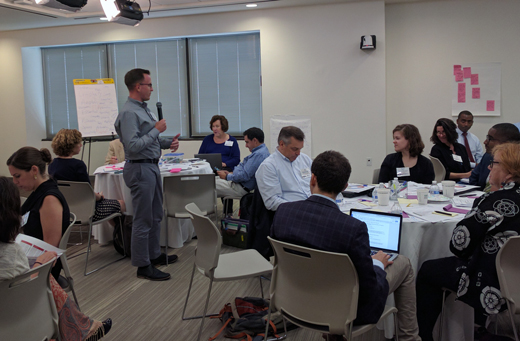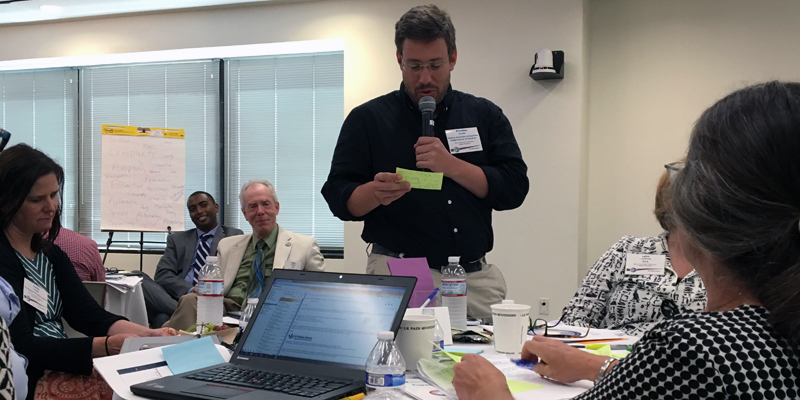Several North Carolina organizations participated in the BroadbandUSA “Community Connectivity Initiative” workshop in Washington, DC, this summer, positioning the state as a leader in broadband initiatives, and Charlotte as a potential pilot city for upcoming projects.
Digital Charlotte, the North Carolina State Department of Information Technology, and MCNC – the state’s advanced network infrastructure provider for higher education and research – all participated in the June 28-29 event. BroadbandUSA is an initiative designed to help communities expand broadband capacity and promote broadband adoption, and is a part of the National Telecommunications and Information Administration.
The Community Connectivity Initiative is designed to create three new resources for communities: a community connectivity framework, an online self-assessment tool, and a report and recommendations.
Dr. Brandon Brooks, assistant professor of communication, and Bruce Clark, digital inclusion project manager, participated from the Queens Knight School of Communication. Other representatives came from Washington government and non-profit initiatives focused on broadband technology, and from city and state initiatives that included Baltimore; Chicago; Kansas City; New York City; Shaker Heights, Ohio; Shawnee, Okla.; Maine; Mississippi; Montana; Pennsylvania; and Wisconsin.
In December 2015, Charlotte was one of the first stops for NTIA as the organization met with communities across the country to discuss the creation of a tool that could be used to assess broadband access and adoption. Credit for Charlotte’s early entry in the conversation starts with Susan Patterson, the Knight Foundation’s former Charlotte program director, who made connections that led to involvement in the process by city digital inclusion leaders, and invitation to the workshop.
The two-day workshop, hosted at New America’s office in Washington, had four key objectives:
- Conduct in-depth review and refinement of the Connectivity Framework
- Review assessment questions and response options
- Further explore use models, value and opportunity to drive impact
- Estimate the level of effort and benefit associated with self-assessment
“It was clear from my time in DC that real-world stories and examples from our communities are heard loud and clear in the beltway,” Clark said. He reported three possible positive outcomes from Charlotte’s involvement in the workshop:
- The opportunity to engage with and connect to practitioners and organizations heavily involved in this work from across the country. These relationships allow the sharing of best practices, identification of resources, and the development of creative solutions to tough problems. This also elevates the work happening in the Charlotte community.
- Charlotte could become a pilot location for some of these resources, including the online assessment tool. First-mover status could bring benefits including community confidence, additional resources, and access to innovative tools that are helping more rapidly ensure universal broadband access.
- Networking on a national level helps Charlotte identify ways to measure work and align results with the outcomes desired in the community.
“The workshop and the outcomes we’re looking for really get to why we’re doing this work,” Clark said. “We believe that broadband access in the home, along with the technology and education to take advantage of it, can have transformative effects on the people of our community. This process gives the insight to see if we are hitting the mark.”
The Smart Chicago organization recently discussed involvement with the Community Connectivity Initiative, and more information on the program is available on the BroadbandUSA website.
 Top: Dr. Brandon Brooks of the Queens Knight School of Communication, in discussion at the Community Connectivity Initiative workshop in Washington. Bottom: Bruce Clark, also of the Knight School, presenting at the workshop.
Top: Dr. Brandon Brooks of the Queens Knight School of Communication, in discussion at the Community Connectivity Initiative workshop in Washington. Bottom: Bruce Clark, also of the Knight School, presenting at the workshop.
